Toyota Yaris Cross SUV review: Cheap SUV is fun and functional
The Japanese brand’s dominance on the Australian sales charts is expected to increase with the release of its new cut-price SUV. Check out full details here.
New Cars
Don't miss out on the headlines from New Cars. Followed categories will be added to My News.
Toyota has moved to cement its spot as king of the off-road with the launch of its seventh SUV, the Yaris Cross.
Slotting beneath the C-HR, the newcomer shares its DNA — including underpinnings, engines and interior — with the Yaris hatch.
It gets a larger body, though, and while it’s Toyota’s smallest SUV, it’s bigger than the original RAV4 of the 1990s.
Squared-off wheel arches and plastic cladding give the requisite adventurous look, although don’t go thinking of wild explorations.
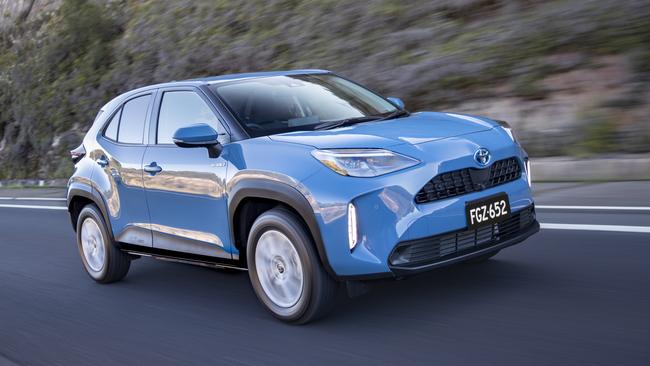
The Yaris Cross also gets rear disc brakes instead of the Yaris’s drums, plus there’s a handbrake button instead of a lever.
Three grades — GX, GXL and Urban — have identical engines to the regular Yaris, albeit with no manual gearbox. That translates to an 88kW/145Nm 1.5-litre three-cylinder or a less powerful version as part of a hybrid system for a combined 85kW, each with a CVT auto.
An optional rear motor creates an all-wheel drive system aimed at dirt tracks or snow.
As Toyota’s most affordable SUV the Yaris Cross fills a void left by creeping price rises in the city SUV market, although it is still more expensive than key rivals such as the Mazda CX-3 and Hyundai Venue.
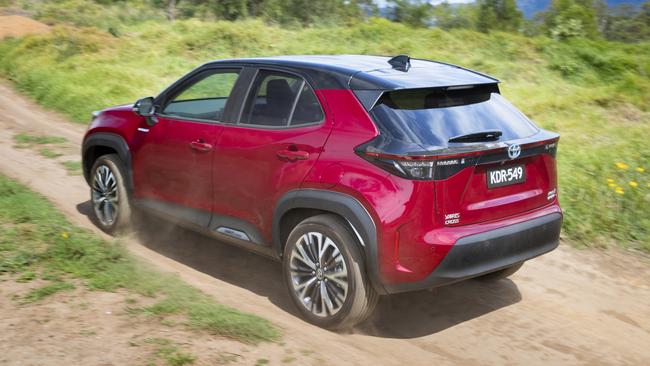
From about $30,700 drive-away it gets 16-inch alloys, eight airbags (including centre front), a smart key, digital radio and Apple CarPlay/Android Auto on a 7.0-inch touchscreen.
The Yaris Cross also debuts Toyota Connected Services, which uses a phone network to track the car if it is stolen or dial a call centre after a crash to relay information to emergency services.
The Hybrid adds about $2100 but lowers claimed fuel use from 5.4 litres per 100km to 3.8L/100km. Over 15,000km the Hybrid would save a few hundred dollars a year. In the real world — and if petrol prices increase — those savings will be higher.
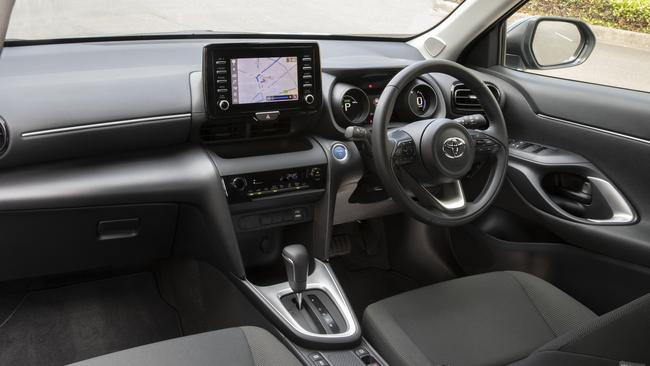
Adding the all-wheel-drive system costs another $3100 but deletes the space-saver spare because the rear motor fills the space it used to sit in. AWDs also lose the split boot floor, reducing capacity from 390 litres to 314L. All get 40/20/40 split-folding rear seats.
The GXL ($33,700-$38,900) adds sat-nav, parking sensors front and rear, blind-spot monitoring and rear cross-traffic alert.
Those with up to $42,000 to spend get the Urban with a head-up display, powered tailgate, heated front seats, powered driver’s seat and “tweed-like” trim with fake leather highlights.
There’s also a colour palette ranging from bold to curious, including a two-tone combination with a gold roof and mirrors.
The taller stance makes getting in and out easier than a regular Yaris and the back seat is vaguely adult friendly, albeit with compact knee room.
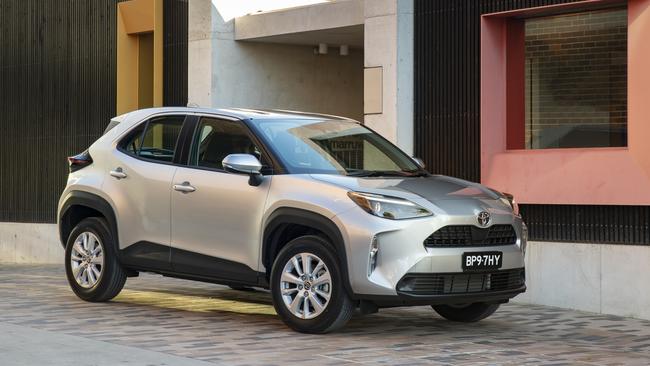
There’s no covered centre console but otherwise good storage, including dash binnacles.
The hybrid makes the most of modest outputs, although the thrummy three-cylinder petrol engine does most work if pushing on.
The Hybrid’s motor is most effective on initial throttle applications, where a useful swell of torque shift things nicely.
It’s can even elicit a small spin of the front wheels on a wet road.
That’s partly due to tyres. We haven’t tried the larger 18s on the Urban, but the 16s on others appear focused more on saving fuel than hugging bends. That’s especially noticeable on a wet road where it pays to tread gently. There’s also noise at speed, mostly from the rear.
It’s a shame, because the core dynamics are engaging.
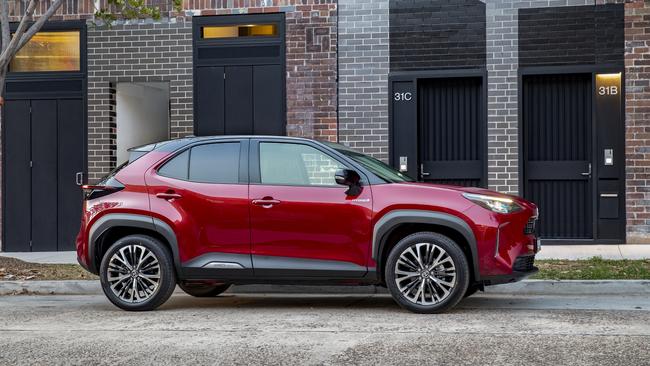
Toyota says 60 per cent of torque can be sent to the rear of the all-wheel-drive, but that doesn’t stop the occasional front-wheel slip when taking off.
Fuel use is a plus, though.
Even when driven enthusiastically you’re unlikely to sip more than 4.5L/100km. That it only needs regular unleaded is a bonus when many (including C-HR) demand premium.
There are quirks and shortcomings but the Yaris Cross is a fun and functional addition to the evolving Toyota SUV family.
It’s more than a Yaris on steroids, with improvements that justify the circa-$3000 step-up.
VERDICT 3.5/5
City-focused SUV with Yaris DNA but its own functional personality.
TOYOTA YARIS CROSS HYBRID 2WD VITALS
Price: From $32,700 drive-away
Warranty/servicing: 5 yrs/unlimited km, $1025 for 5 yrs/75,000km
Safety: 5 stars, 8 airbags, auto emergency braking, lane-keep assist, speed-sign recognition, adaptive cruise
Engine: 67kW/120Nm 1.5-litre 3-cylinder with 59kW/141Nm electric motor, 85kW combined output
Thirst: 3.8L/100km
Spare: Space-saver
Boot: 390L
